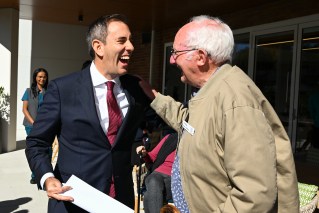After 20 years in jail for killing her own chidren, Folbigg cleared of all charges
After spending more than two decades in jail, Kathleen Folbigg has been cleared of causing the deaths of her four children.

Kathleen Folbigg along with Tracy Chapman (left) arrives at the New South Wales Court of Criminal Appeal in Sydney,(AAP Image/Dan Himbrechts)
“I hoped and prayed that one day I would be able to stand here with my name cleared,” she said outside the NSW Court of Criminal Appeal, where applause broke out minutes earlier as her convictions were quashed on Thursday.
Once labelled Australia’s worst female serial killer, the 56-year-old was granted an unconditional pardon and released from jail in June after an inquiry heard there was reasonable doubt about her guilt.
“Today she is a free woman,” Ms Folbigg’s lawyer Rhanee Rego said, adding that her imprisonment should become a major impetus to improve the legal system.
In a final report released in November, inquiry commissioner Tom Bathurst KC found there was an “identifiable cause” for three of the deaths and Ms Folbigg’s relationship with her children did not support the case that she killed them.
Mr Bathurst’s report was sent to the appeal court, which delivered its ruling on Thursday.
“While the verdicts at trial were reasonably open on the evidence then available, there is now reasonable doubt as to Ms Folbigg’s guilt,” NSW Chief Justice Andrew Bell said.
“It is appropriate Ms Folbigg’s convictions … be quashed,” he said.
A substantial and significant new body of scientific evidence had become available since Ms Folbigg’s trial, diminishing the force of what had previously been relied upon as powerful coincidence and tendency evidence, the court ruled.
The judges agreed with Mr Bathurst’s finding that the mother’s diary entries – controversially used to help secure her convictions – did not demonstrate Ms Folbigg’s guilt.
“It may readily be understood how certain entries, viewed in isolation, had a powerful influence on the original jury,” Justice Bell said.
“Viewed in their full context, however, as they must be, and informed by the expert psychological and psychiatric expert evidence … which was not before the jury … the diary entries were not reliable admissions of guilt.”
The diaries showed Ms Folbigg’s private feelings in words she never expected to be read and interpreted by strangers.
“They took my words out of context and they turned them against me,” Ms Folbigg said after her acquittal.
“I love my children and I always will.”
While grateful scientific evidence had given her answers for the deaths of her children, Ms Folbigg lamented a system that sought to blame her rather than accept children could die suddenly, unexpectedly and heartbreakingly.
Ms Folbigg was convicted in 2003 and sentenced to 40 years, eventually appealed to a minimum 25-years, for the suffocation murders of three of her children and manslaughter of a fourth.
The children, Caleb, Patrick, Sarah and Laura, died between 1989 and 1999 at ages ranging from 19 days to 18 months.
A rare genetic variation was a “reasonably possible cause” of Sarah and Laura’s deaths, according to cardiology and genetics experts.
Myocarditis, an inflammation of the heart, was another possible cause of Laura’s death.
Patrick may have died from a neurogenetic disorder, which could have also hospitalised him before his death, the inquiry heard.
Reasonable causes for their deaths undermined the tendency reasoning used to convict Ms Folbigg of Caleb’s manslaughter.
Ms Folbigg’s lawyers will now be seeking compensation for her lost decades.
“I’m not prepared to put a figure on it but it will be bigger than any substantial payment that has been made before,” Ms Rego said.
A spokesman for NSW Attorney-General Michael Daley said the government would carefully consider any submissions from Ms Folbigg’s legal team for compensation.
“After all that has happened over the last 20 years, it is impossible not to feel great sympathy for all involved,” the spokesman said.
Ms Folbigg could seek compensation through the courts or the government could elect to make an ex-gratia payment, available to people who have suffered loss directly attributable to state actions.












